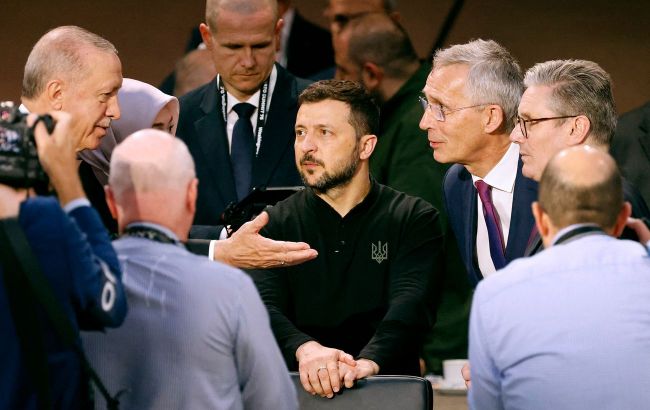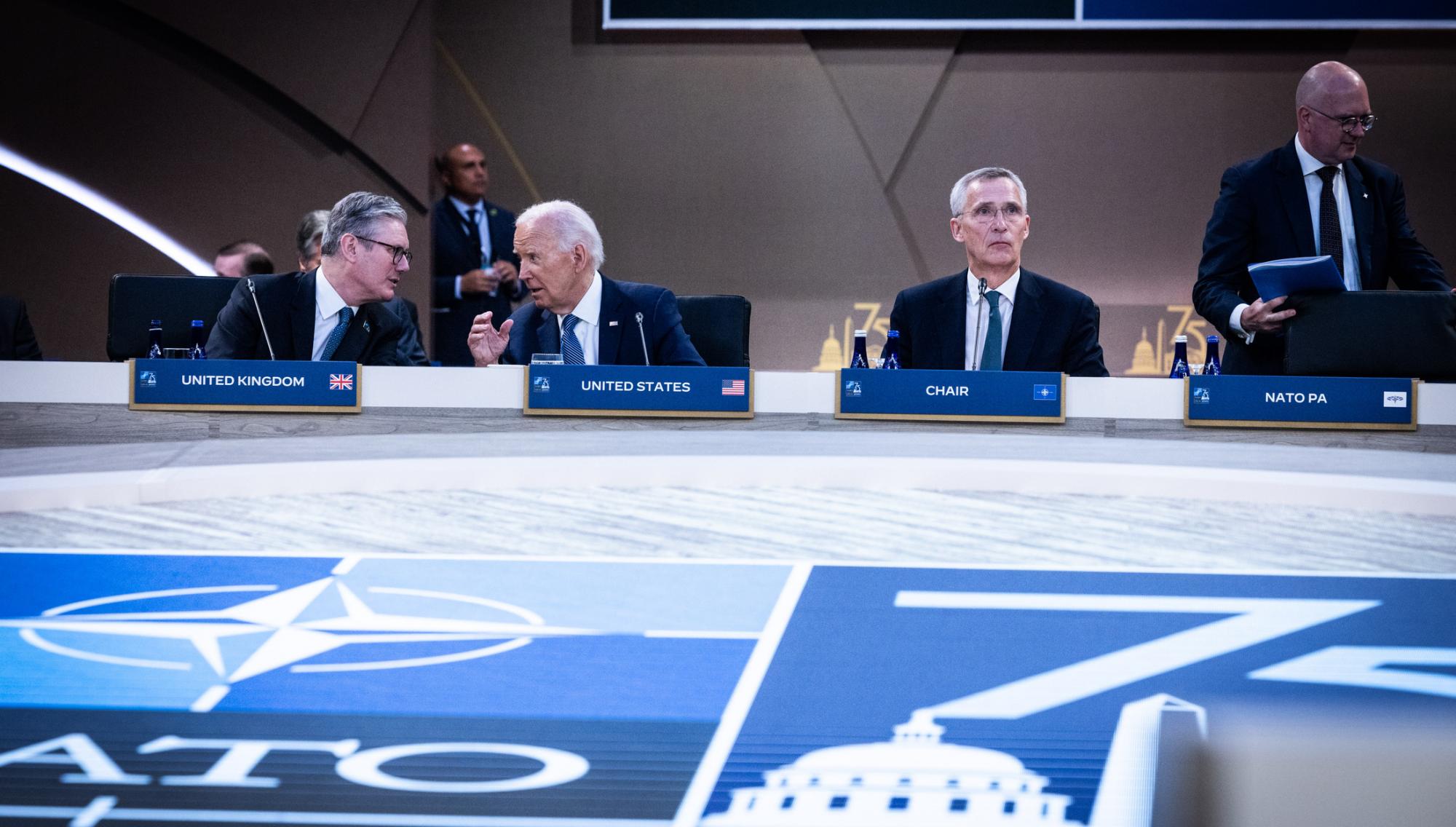No invitation, but air defense and F-16s: What Ukraine gained from NATO summit
 Volodymyr Zelenskyy with Recep Tayyip Erdoğan, Jens Stoltenberg and Kier Starmer at the NATO summit (photo: Getty Images)
Volodymyr Zelenskyy with Recep Tayyip Erdoğan, Jens Stoltenberg and Kier Starmer at the NATO summit (photo: Getty Images)
The Washington NATO summit is over. Ukraine, as expected, did not receive an invitation to join the Alliance, but will receive new air defense systems and, very soon, the long-awaited F-16 aircraft. Read more about the results of the summit in RBC-Ukraine's article.
Contents
- Summit atmosphere in Washington
- Ukraine in final declaration of summit
- Practical results: Air defense, aircraft, bilateral agreements
"If we really want to have Ukraine on the map, and not to have Putin, who has attacked half of the planet, we need to take very concrete steps," President Volodymyr Zelenskyy said at the NATO summit. As for the supply of new weapons to Ukraine, there was no shortage of speed or specifics - the content of some of the aid packages agreed upon at the summit has not even been made public yet. But the key political decision to invite Ukraine to join NATO is being slowed down and specifics are being avoided. Although the wording "open door to NATO" has been changed to "bridge to NATO," the road across this bridge may still be long for Ukraine, as it was before.
Summit atmosphere in Washington
From the very beginning, the Ukrainian leadership did not have high expectations of the summit, unlike last year's NATO meeting in Vilnius. Therefore, the tone of statements before Washington was less critical.
Instead, Ukraine's key foreign policy speakers conveyed a constructive approach, with a minimum of criticism of NATO. This approach paid off, and Ukraine gained quite a bit at this year's NATO summit. Given what it could have expected.
An additional bonus for Ukraine was the opportunity to hold some bilateral meetings, as is usually the case at such summits. At most of them, President Zelenskyy did not hide his positive emotions and good mood.
Among the key meetings were talks with the new UK Prime Minister, Keir Starmer, which were important for cementing personal contacts. Meetings with Canadian Prime Minister Justin Trudeau, German Chancellor Olaf Scholz, US President Joe Biden, and US House Speaker Mike Johnson were equally important in terms of continuing support for Ukraine.
In addition to the allocation of regular aid packages, a Defense Fund will be created with Denmark and the Netherlands. Denmark also became the first country to finance military production in Ukraine directly. Canada will also join the Ukrainian pilot training on flight simulators. It was also announced that Ukraine would receive new air defense systems. US Secretary of State Antony Blinken said the first F-16s are already being delivered.
The Ukraine Compact was also signed, an umbrella document that brought together countries that had already signed bilateral security treaties with Ukraine.
Ukraine in final declaration of summit
NATO Secretary General Jens Stoltenberg had said that Ukraine would be one of the main topics of the summit even before the summit. Of course, along with the overall strengthening of the Alliance's capabilities to deter Russia.
"Russia’s full-scale invasion of Ukraine has shattered peace and stability in the Euro-Atlantic area and gravely undermined global security. Russia remains the most significant and direct threat to Allies’ security," the summit's final communiqué reads.
To counteract Russia, the summit approved many specific response plans unavailable to the public. Also, NATO member states approved a new mechanism to help with weapons production. Kyiv's role in deterring Russia is now key, so it is not surprising that Ukraine was mentioned about 60 times in the document.
As expected, the text does not contain an invitation to join. Instead, there is a phrase about the "irreversibility" of Ukraine's membership in NATO. But with some nuances. For example, NATO "welcomes the concrete progress Ukraine has made since the Vilnius Summit on its required democratic, economic, and security reforms."
However, the communiqué repeats the formula that an invitation to join can only be extended to Ukraine when Allies agree and conditions are met.
 UK Prime Minister Keir Starmer, US President Joe Biden, and NATO Secretary General Jens Stoltenberg at the summit in Washington (photo: nato.int)
UK Prime Minister Keir Starmer, US President Joe Biden, and NATO Secretary General Jens Stoltenberg at the summit in Washington (photo: nato.int)
Western politicians have been saying that Ukraine can become a NATO member only after the war is over for a long time. This time, however, the text of the communiqué also includes a link to reforms. This is another way to make Ukraine a de facto NATO member when the Ukrainian Armed Forces will be interoperable with NATO troops. But not de jure, because that means political commitments.
"Theoretically, we can say for a long time that the door is open to NATO or any organization. But this will not have practical consequences. And, of course, de jure, joining NATO means the fifth article. It means intervention, and it means the death of the military of other countries. At the moment, they have no such desire, particularly France. Although the danger theoretically exists. And there is hope that this conflict will not be escalated to a greater level, which Ukrainians are currently managing to contain," Oksana Mitrofanova, a researcher at the Paris-based Center for Research on Europe and Eurasia (CREE), tells RBC-Ukraine.
According to her, no matter how cynical it may sound, it is beneficial for NATO countries to send financial and military aid, but not soldiers who may die.
But even with this relatively cautious wording, Ukrainian diplomats had to fight for it. According to RBC-Ukraine, the United States opposed the words "irreversibility," but the American position was changed during the top-level talks at the G7 summit in Italy.
Practical results: Air defense, aircraft, bilateral agreements
The relatively weak political wording was largely offset for Ukraine by the practical achievements of the summit.
"If there is no political decision on Ukraine in terms of an invitation, then, of course, something on the scales must be the same or even more significant. That's why, in principle, NATO is focusing on practical assistance," Serhii Dzherdzh, head of the NATO-Ukraine Civic League, tells RBC-Ukraine.
NATO member states have decided to create a new structure, NATO Security Assistance and Training for Ukraine (NSATU), to coordinate the training and development of the Ukrainian Armed Forces on the path to full interoperability. A three-star American general will head the structure and will be conducted in several allied countries. At the same time, the NSATU will not, according to international law, turn NATO into a party to the conflict.
NATO countries also pledged "to provide a minimum baseline funding of €40 billion within the next year, and to provide sustainable levels of security assistance for Ukraine to prevail."
A NATO-Ukraine Joint Analysis, Training and Education Center (JATEC) will be established. The Alliance notes this is "an important pillar of practical cooperation, to identify and apply lessons from Russia’s war against Ukraine and increase Ukraine’s interoperability with NATO."
Equally important is the appointment of a high-level civilian NATO representative in Ukraine. This will strengthen Ukraine's interaction with the Alliance.
"Previously, it (the NATO Representation in Ukraine - ed.) combined the NATO Information and Documentation Center in Ukraine and the NATO Liaison Office. The former dealt with journalists, media, and information issues. The latter was in charge of cooperation with the Ministry of Defense and the military. Now, the functions will be expanded, the status will be raised, and, accordingly, a new representative will have more opportunities to influence Ukraine's cooperation with NATO," says Serhii Dzherdzh.
In general, despite the relative weakness of political signals, Ukraine has received significant practical assistance from NATO and an understanding of how to develop a partnership with the Alliance. The issue of formal accession, blocked primarily by the United States and Germany, remains closed and can only be revisited after Ukraine's victory in the war.



